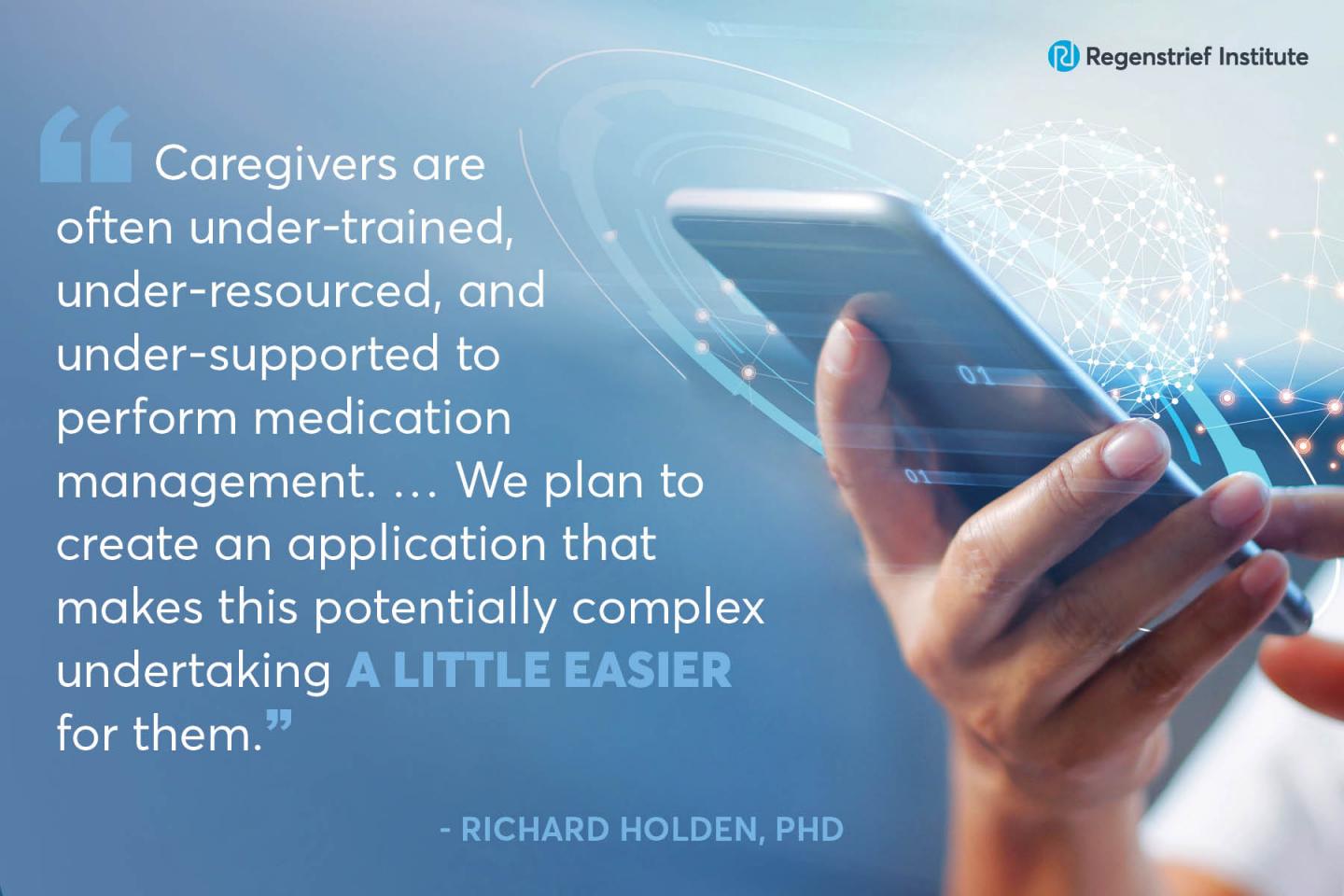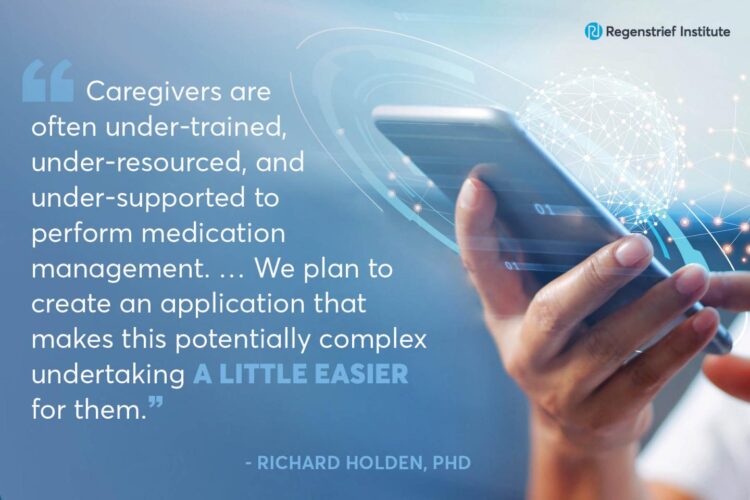NIA grant will fund user-centered design to create and test Helping the Helpers app

Credit: Regenstrief Institute
INDIANAPOLIS — Most of the six million people in the U.S. who live with Alzheimer’s disease and related dementias rely on informal caregivers, usually family or friends, to help manage their medications. Researchers from Regenstrief Institute, Indiana University and University of Wisconsin have received a grant to create an application to support those caregivers.
“Caregivers are often under-trained, under-resourced, and under-supported to perform medication management. It can lead to significant burden, stress and even inappropriate medication use,” said Richard Holden, PhD, a co-leader of the project. “To this point, technology has not been leveraged to help this population. Using participatory user-centered design, we plan to create an application that makes this potentially complex undertaking a little easier for them and leads to better medication adherence and safety.” Dr. Holden is a research scientist at Regenstrief Institute and a professor and chair of health and wellness design at IU School of Public Health-Bloomington.
The app is called Helping the Helpers, and the project employs the three phases of participatory user-centered design. The team will start by interviewing and assessing the needs of the caregivers. Then those caregivers will work with the team to create the app with features and functionality that will benefit them. As co-designers, the caregivers will take part in all the design activities and will have equal say in the final product as members of the research team. The final phase will more widely test the app to see if caregivers can and will use it.
“This type of support is lacking for these caregivers, and technology provides an ideal way to reach them,” said Nicole Werner, PhD, co-leader of the project and an associate professor of industrial and systems engineering at the University of Wisconsin-Madison. “But an application is useless if these caregivers can’t or won’t use it. That’s why we are involving them in the design process from the very start, so we can create something that effectively addresses the struggles they and others like them are facing.”
“User-centered design is the industry gold standard process for designing products,” said Dr. Holden. “Any time technology is used, it must address end users’ needs. We are grateful for the National Institute on Aging’s support of this user-centered design approach.”
###
This research is supported by the National Institutes of Health’s National Institute on Aging, grant R21AG072418.
Other research scientists involved in the project are Malaz Boustani, M.D., MPH of Regenstrief and IU School of Medicine and Aaron Ganci, MFA from IUPUI’s Herron School of Art and Design. Noll Campbell, PharmD of Regenstrief and Purdue University College of Pharmacy is consulting.
The content is solely the responsibility of the authors and does not necessarily represent the official views of the National Institutes of Health.
About Regenstrief Institute
Founded in 1969 in Indianapolis, the?Regenstrief Institute?is a local, national and global leader dedicated to a world where better information empowers people to end disease and realize true health. A key research partner to Indiana University, Regenstrief and its research scientists are responsible for a growing number of major healthcare innovations and studies. Examples range from the development of global health information technology standards that enable the use and interoperability of electronic health records to improving patient-physician communications, to creating models of care that inform practice and improve the lives of patients around the globe.?
Sam Regenstrief, a nationally successful entrepreneur from Connersville, Indiana, founded the institute with the goal of making healthcare more efficient and accessible for everyone. His vision continues to guide the institute’s research mission.
About IU School of Medicine
IU School of Medicine is the largest medical school in the U.S. and is annually ranked among the top medical schools in the nation by U.S. News & World Report. The school offers high-quality medical education, access to leading medical research and rich campus life in nine Indiana cities, including rural and urban locations consistently recognized for livability.?
About University of Wisconsin-Madison College of Engineering
The UW-Madison College of Engineering is among the nation’s top engineering schools, consisting of eight degree-granting departments and one of the nation’s oldest and largest continuing education programs for professional engineers. The college develops the leaders, knowledge and technologies that improve lives now and create a better future. It draws upon the strength and collaborative spirit of one of the top research universities in the world.
About Richard J. Holden, PhD, M.S.
In addition to his role as a research scientist at Regenstrief?Institute, Richard J. Holden, PhD, M.S., is the chief healthcare engineer for the Center for Health Innovation and Implementation Science and the Dean’s Eminent Scholar, professor and inaugural chair of Health & Wellness Design at Indiana University School of Public Health-Bloomington.
About Nicole Werner, PhD
Nicole Werner, PhD, is the Harvey D. Spangler Associate Professor, Department of Industrial and Systems Engineering in the College of Engineering at the University of Wisconsin-Madison, associate director, Wisconsin Institute for Healthcare Systems Engineering, and Care Research Technology and Small Business Liaison Leader of the Wisconsin Alzheimer’s Disease Research Center Dementia Care Core.
Media Contact
Cindy Fox Aisen
[email protected]





